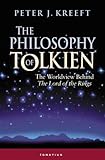The philosophy of Tolkien : the worldview behind The lord of the rings / Peter Kreeft. [print]
Material type: TextPublication details: San Francisco : Ignatius Press, (c)2005.Description: 237 pages ; 21 cmContent type:
TextPublication details: San Francisco : Ignatius Press, (c)2005.Description: 237 pages ; 21 cmContent type: - text
- unmediated
- volume
- 9781586170257
- Worldview behind The lord of the rings
- PR6039.K92.P455 2005
- PR6039
- COPYRIGHT NOT covered - Click this link to request copyright permission:
| Item type | Current library | Call number | Status | Date due | Barcode | |
|---|---|---|---|---|---|---|
 Circulating Book (checkout times vary with patron status)
Circulating Book (checkout times vary with patron status)
|
G. Allen Fleece Library CIRCULATING COLLECTION | PR6039.O32.L6347 2005 (Browse shelf(Opens below)) | Available | 31923001899547 |
Metaphysics. How big is reality? -- Is the supernatural real? -- Are Platonic ideas real? -- Philosophical theology. Does God exist? -- Is life subject to divine providence? -- Are we both fated and free? -- Can we relate to God by "religion"? -- Angelology. Are angels real? -- Do we have guardian angels? -- Could there be creatures between men and angels, such as elves? -- Cosmology. Is nature really beautiful? -- Do things have personalities? -- Is there real magic? -- Anthropology. Is death good or bad? -- Is romance more thrilling than sex? -- Why do humans have identity crises? -- What do we most deeply desire? -- Epistemology. Is knowledge always good? -- Is intuition a form of knowledge? -- Is faith (trust) wisdom or ignorance? -- What is truth? -- Philosophy of history. Is history a story? -- Is the past (tradition) a prison or a lighthouse? -- Is history predictable? -- Is there devolution as well as evolution? -- Is human life a tragedy or a comedy? -- Aesthetics. Why do we no longer love glory or splendor? -- Is beauty always good? -- Philosophy of language. How can words be alive? -- The metaphysics of words : can words have real power? -- Are there right and wrong words? -- Is there an original, universal, natural language? -- Why is music so powerful? -- Political philosophy. Is small beautiful? -- Can war be noble? -- Ethics : the war of good and evil. Is evil real? -- How powerful is evil? -- How weak is evil? -- How does evil work? -- Ethics : the "hard" virtues. Do principles or consequences make an act good? -- Why must we be heroes? -- Can one go on without hope? -- Is authority oppressive and obedience demeaning? -- Are promises sacred? -- Ethics : the "soft" virtues. What is the power of friendship? -- Is humility humiliating? -- What should you give away? -- Does mercy trump justice? -- Is charity a waste? -- Conclusion. Can any one man incarnate every truth and virtue?
"Peter Kreeft takes the reader on a voyage of discovery into the philosophical bones of Middle earth. Like a good concordance, this book organizes the philosophical themes in The Lord of the Rings into 50 categories, accompanied by over 1,000 references to the text." "Since many of the great questions of philosophy are included in the 50-theme outline, this book can also be read as an introduction to philosophy. For each of the philosophical topics in The Lord of the Rings, Kreeft presents four tools by which they can be understood: an explanation of a key question; a key quotation showing Tolkien's answer; quotes from other writings of Tolkien that clarify the theme; and quotes from his close friend C.S. Lewis, which state the same philosophical points directly."--
COPYRIGHT NOT covered - Click this link to request copyright permission:
There are no comments on this title.
